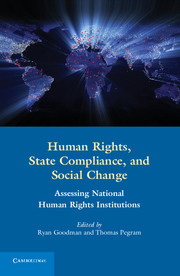Book contents
- Frontmatter
- Contents
- Contributors
- Preface
- 1 Introduction
- PART I NHRIs in Theory and Reality
- PART II NHRI Performance
- 5 National Human Rights Institutions and the International Human Rights System
- 6 National Human Rights Institutions in Anglophone Africa
- 7 National Human Rights Institutions in the Asia Pacific Region
- 8 National Human Rights Institutions in Central and Eastern Europe
- 9 National Human Rights Institutions in Latin America
- PART III NHRIs and Compliance
- PART IV Final Reflections
- Annex 1
- Index
- References
7 - National Human Rights Institutions in the Asia Pacific Region
Change Agents under Conditions of Uncertainty
from PART II - NHRI Performance
Published online by Cambridge University Press: 05 June 2012
- Frontmatter
- Contents
- Contributors
- Preface
- 1 Introduction
- PART I NHRIs in Theory and Reality
- PART II NHRI Performance
- 5 National Human Rights Institutions and the International Human Rights System
- 6 National Human Rights Institutions in Anglophone Africa
- 7 National Human Rights Institutions in the Asia Pacific Region
- 8 National Human Rights Institutions in Central and Eastern Europe
- 9 National Human Rights Institutions in Latin America
- PART III NHRIs and Compliance
- PART IV Final Reflections
- Annex 1
- Index
- References
Summary
Introduction
In 1996, within the Asia Pacific region, there were only five national human rights institutions (NHRIs): the Australian Human Rights and Equal Opportunity Commission, the National Human Rights Commission of India, the Indonesian National Commission on Human Rights, the New Zealand Human Rights Commission, and the Philippines Commission on Human Rights. In July 1996, representatives from the NHRIs of Australia, India, Indonesia, and New Zealand met in Darwin, Australia, to attend a meeting sponsored by the United Nations Office of the High Commissioner for Human Rights (OHCHR). The meeting was also attended by representatives of eight governments considering the establishment of NHRIs (Fiji, Mongolia, Nepal, Pakistan, Papua New Guinea, Solomon Islands, Sri Lanka, and Thailand) and representatives of several nongovernmental organizations (NGOs). The NHRI participants at the Darwin meeting decided to form the Asia Pacific Forum of National Human Rights Institutions (APF), a network to enhance regional cooperation and capacity building among NHRIs. The conclusions of the Larrakia Declaration, which emanated from that first meeting of NHRIs from the Asia Pacific region, stated that
The promotion and protection of human rights is the responsibility of all elements of society and all those engaged in the defense of human rights should work in concert to secure their advancement;
NHRIs should work in close cooperation with nongovernmental organizations and wherever possible with governments to ensure that human rights principles are fully implemented in effective and material ways;
Regional cooperation is essential to ensure the effective promotion and protection of human rights; and
To ensure effectiveness and credibility, the status and responsibilities of NHRIs should be consistent with the Principles relating to the status of national institutions adopted by the General Assembly that provide that NHRIs should be independent, pluralistic and established wherever possible by the Constitution or by legislation and in other ways conform to the Principles.
- Type
- Chapter
- Information
- Human Rights, State Compliance, and Social ChangeAssessing National Human Rights Institutions, pp. 150 - 180Publisher: Cambridge University PressPrint publication year: 2011
References
- 1
- Cited by



